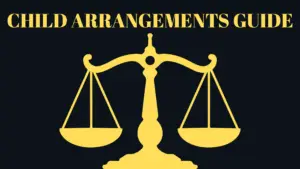CAFCASS Report Wrong? Your Strategic Guide to Responding
“Last Updated” Date: Friday, 17 October 2025
Receiving a CAFCASS report you know is wrong—filled with inaccuracies, biased opinions, or outright lies—is a moment your world turns upside down. I have worked with countless fathers who, upon reading that document, feel that they have been subjected to significant emotional discomfort. It feels like an official verdict has been passed against you, one that could determine the future of your relationship with your children, and it’s based on a version of reality you don’t even recognise.
Your first instinct might be to fire off an angry email or shout about bias in court. This is a critical mistake. This guide provides a strategic framework for what to do when your CAFCASS report is wrong, ensuring you engage with the court process calmly and effectively. Following these steps can turn a moment of crisis into an opportunity to demonstrate your credibility and focus the court on the facts.
Key Takeaways
- Differentiate Your Response: Simple factual errors (e.g., wrong dates or names) should be corrected in writing with CAFCASS directly. Disputed matters and opinions in a wrong CAFCASS report must be challenged formally in court.
- Strategy Over Anger: Accusing a CAFCASS officer of “bias” is a high-risk strategy that often backfires. A more powerful approach is to calmly dismantle the report’s logic with facts and evidence.
- Use a Point-by-Point Rebuttal: The most effective way to challenge a report is to go through it line-by-line, providing clear evidence that contradicts each inaccuracy or false assumption.
- Formal Court Actions: If a CAFCASS report is wrong, you can ask the judge to direct the officer to attend the next hearing for questioning or to order a more detailed Section 7 report.
Facing an unfair report? Let’s build your strategy together. Message us on WhatsApp.
Jump To
- Your First Steps When a CAFCASS Report is Wrong
- A Strategic Guide for Challenging a Wrong CAFCASS Report
- At a Glance: Challenging in Court vs. Making a Formal Complaint
- Common Mistakes When Responding to a Wrong CAFCASS Report
- FAQs: What to Do When Your CAFCASS Report is Wrong
As a former social worker who wrote these very reports, I can tell you that a father who responds to a flawed document with calm, organised corrections gives the court the tools it needs to see the true picture. This guide on what to do when a CAFCASS report is wrong is part of our series on navigating your first court hearing. We also have detailed guides on writing your Position Statement and understanding the CAFCASS Safeguarding Letter.
Your First Steps When a CAFCASS Report is Wrong
Your first action depends entirely on the type of inaccuracy you’ve found. The court treats simple mistakes very differently from disputed allegations. Understanding this distinction is the first step in your strategic response.
Factual Error
A factual error is a mistake that can be proven wrong with simple, objective evidence. This includes things like incorrect dates of birth, wrong spellings of names, or stating an event happened on a day you can prove you were elsewhere. As outlined in the official CAFCASS process, these should be addressed directly.
What This Means For You: You should contact the CAFCASS officer in writing (email is fine) as soon as possible. Calmly and politely point out the specific factual error and provide the correct information. For example, “Paragraph 3 of the letter states the separation occurred in May 2024. For clarity, it was in fact May 2023.”
Disputed Matter
A disputed matter is an allegation made by the other party, an opinion expressed by the officer, or a conclusion that you believe is wrong. For example, if the other party made a false allegation during their CAFCASS call that is now in the report, this is a disputed matter.
What This Means For You: These issues must be addressed in court. Do not get into a back-and-forth debate with the CAFCASS officer over email. Your job is to present your counter-arguments and evidence to the judge, usually within your Position Statement for the hearing.
A Real Life Scenario: A father receives a CAFCASS safeguarding letter he believes is wrong. It incorrectly states his child’s school (a factual error) and also includes the mother’s allegation that he misses contact (a disputed matter). He emails the officer to provide the correct school name. He then prepares a Position Statement for the hearing, attaching a log of all contact sessions with dates and times to challenge the disputed allegation in front of the judge.
A Strategic Guide for Challenging a Wrong CAFCASS Report in Court
Once in court, your goal is to systematically and calmly deconstruct the report’s flaws. Avoid unfocused complaints and instead use these evidence-based tactics from our guide.
- Challenge the Logic, Not the Person: Instead of stating “the officer is biased,” focus on the weaknesses in their reasoning. Ask questions that expose the gaps. For example: “The report concludes I am a risk due to one allegation, but it doesn’t appear to have considered the ten positive nursery reports attached to my statement. Can the court be satisfied that a balanced view was taken?”
- Go Line-by-Line with Facts: This is your most powerful tool. In your Position Statement or witness statement, create a simple table. In one column, quote the incorrect statement from the report. In the next column, state why it is wrong and reference your evidence. For example: “Report says: ‘Father has never attended medical appointments.’ | Fact: This is incorrect. Please see Exhibit A, a letter from the GP confirming my attendance on 15/09/25.”
- Use the Child Welfare Checklist: The law requires CAFCASS and the court to prioritise the child’s welfare above all else, often guided by the principles in the Working Together to Safeguard Children guidance. You can argue that a wrong CAFCASS report has failed to do this properly. For instance: “The report places significant weight on the mother’s feelings but fails to adequately consider the harm to the child caused by the ongoing lack of contact, which is a key factor of the welfare checklist.”
At a Glance: Challenging in Court vs. Making a Formal Complaint
When a CAFCASS report is wrong, many fathers want to immediately file a formal complaint. While understandable, it’s often not the most effective first step for your case.
| Feature | Challenging in Court | Making a Formal Complaint |
|---|---|---|
| Goal | ✅ To influence the judge’s decision in your current case and get the right outcome for your child. | ❌ To hold CAFCASS accountable for procedural failings. It does not directly change the court’s decision. |
| When to Use It | During your proceedings, at every hearing after the report is filed. This is your primary focus. | Generally advised to wait until after your case has concluded to avoid creating conflict with the officer still working on your case. |
| Example | Presenting your line-by-line factual rebuttal to the judge in your Position Statement. | Submitting a complaint form to CAFCASS about the officer’s unprofessional conduct after the final order is made. |
| Legal Test | The judge will weigh your evidence against the report and decide what is in the child’s best interests. | CAFCASS will investigate whether their own procedures and standards were followed correctly. |
| Outcome | ✅ The judge may disregard parts of the report, order a new one, or make a final decision in your favour. | ❌ CAFCASS may issue an apology or promise internal training. It is highly unlikely to change your court order. |
This guide provides the strategy, we provide the support. Chat with us today.
Common Mistakes When Responding to a Wrong CAFCASS Report
As someone who has seen these situations from the inside, the biggest errors fathers make are almost always unforced. They stem from emotion rather than following a strategic guide.
Common Pitfalls:
- Leading with “Bias”: Why this is a mistake: It immediately puts the professional on the defensive and can make you look hostile. Judges are used to parties claiming bias; they are far more interested in facts and evidence that prove a report’s conclusions are unreliable.
- Sending an Angry Email: Why this is a mistake: That email can, and often will, be attached to a future report as evidence of your “aggression” or “inability to work with professionals.” Always remain calm and polite in all written communication.
- Ignoring the Report: Why this is a mistake: Hoping the judge will just see the truth is not a strategy. When a CAFCASS report is wrong, you MUST formally and specifically challenge every single point you disagree with. If you don’t challenge it, the court is entitled to assume you accept it.
FAQs: What to Do When Your CAFCASS Report is Wrong
Here are some of the most common questions fathers ask when they receive a report they know is wrong.
Can a CAFCASS report be overturned?
You cannot “overturn” a report as if it were a verdict, but you can convince a judge that it is flawed and should not be relied upon. By presenting strong, factual evidence, you can lead the judge to disregard the report’s recommendations and make a different decision based on the evidence you provide.
What if the CAFCASS officer lied in their report?
If you can prove with clear evidence that a professional has deliberately misled the court, it is extremely serious. You must present this evidence calmly and clearly to the judge. The best way is to use the “line-by-line” rebuttal strategy outlined in this guide, as this demonstrates the falsehoods with factual proof rather than just an accusation.
Does the judge have to follow the CAFCASS recommendations?
No. A CAFCASS report contains recommendations, not orders. While judges give significant weight to the opinion of the CAFCASS officer, they are the ultimate decision-maker. If you can provide compelling evidence that the CAFCASS recommendations are based on flawed information and are not in your child’s best interests, the judge can make a completely different order.
What can I do if I think the initial safeguarding checks were not thorough enough?
This is a valid point to raise in court. You can request that the judge directs CAFCASS to conduct a more detailed “Section 7 report”. This is appropriate where the initial safeguarding letter is brief, missed key information, or where the issues in the case are too complex to be covered by simple safeguarding checks.
Get Your Case Back on Track
At Dads Consultancy, we provide the specialised, expert support to move you from crisis to control. A bad report is a setback, not a defeat. We can help you with:
- Drafting a Powerful Position Statement to challenge the report
- One-to-one Support and preparation for any CAFCASS interviews
- Understanding the CAFCASS Call process
- Navigating Section 7 Reports
- Preparing effectively for safeguarding calls
- Navigating newer processes like the Pathfinder Pilot
- McKenzie Friend Support in court
A wrong CAFCASS report feels like a judgment, but it is just one piece of evidence. Your strategic response, guided by facts, is the next crucial step. WhatsApp us today for a consultation, and let’s build a clear plan to ensure the court hears the truth.
🧠 Insider Insight: Lach, our founder, is a former Cafcass and Children’s Services Social Worker. He has been on the inside of the family court system, writing the very reports that influence court outcomes. Now he uses that insider knowledge to help dads navigate the process effectively. Learn more about Lach’s background.




